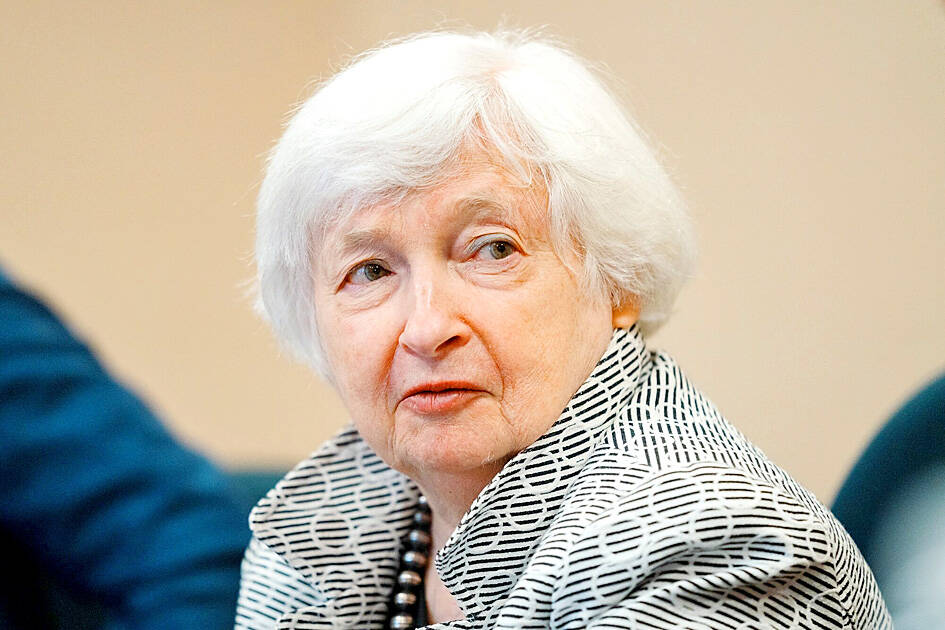US Secretary of the Treasury Janet Yellen said there are no “red lights flashing” for the financial system, and reiterated her view that the US economy has reached a soft landing even as job growth weakens.
“For the US, the kinds of metrics that we would monitor that would summarize risks — whether it’s asset valuations or a good degree of leverage — things look good, I don’t see red lights flashing,” Yellen said on Saturday at the Texas Tribune Festival.
“I’m attentive to downside risks” on employment, she said, adding that job growth is solid.

Photo: Bloomberg
The Treasury chief spoke a day after US equities capped the biggest weekly selloff since the regional banking crisis in March last year — roiled by a weaker-than-expected gain in payrolls that stoked concern that the US Federal Reserve would prove late to begin lowering interest rates.
The S&P 500 Index slid more than 4 percent last week.
“While there are risks, it really has been amazing to be able to get inflation down as meaningfully as we have” while maintaining strong growth, Yellen said. “This is what most people would call a soft landing.”
Yellen highlighted “wages going up at a decent clip,” surpassing the pace of inflation, along with the lack of any mass layoffs. Monthly job gains are at about the level needed to absorb new entrants to the labor market, she said.
Last month’s jobs release showed US hiring fell short of forecasts, with non-farm payrolls rising 142,000. The three-month average hit the lowest since mid-2020, but the unemployment rate edged down to 4.2 percent, Bureau of Labor Statistics data showed. That was the first decline in five months, reflecting a reversal in temporary layoffs.
Yellen also said she would welcome a visit to the US by Chinese Vice Premier He Lifeng (何立峰) and is open to another visit of her own to China, as she underscored the importance of the world’s two largest economies engaging with each other.
“I certainly may go back there — I would welcome a visit by my Chinese counterpart, and my guess is that we will have one way or another a visit,” she said.
Yellen met for hours with He during a visit to Beijing in April, continuing the re-engagement between the two nations that began in November last year with US President Joe Biden’s sit-down with Chinese President Xi Jinping (習近平).

NEW IDENTITY: Known for its software, India has expanded into hardware, with its semiconductor industry growing from US$38bn in 2023 to US$45bn to US$50bn India on Saturday inaugurated its first semiconductor assembly and test facility, a milestone in the government’s push to reduce dependence on foreign chipmakers and stake a claim in a sector dominated by China. Indian Prime Minister Narendra Modi opened US firm Micron Technology Inc’s semiconductor assembly, test and packaging unit in his home state of Gujarat, hailing the “dawn of a new era” for India’s technology ambitions. “When young Indians look back in the future, they will see this decade as the turning point in our tech future,” Modi told the event, which was broadcast on his YouTube channel. The plant would convert

‘SEISMIC SHIFT’: The researcher forecast there would be about 1.1 billion mobile shipments this year, down from 1.26 billion the prior year and erasing years of gains The global smartphone market is expected to contract 12.9 percent this year due to the unprecedented memorychip shortage, marking “a crisis like no other,” researcher International Data Corp (IDC) said. The new forecast, a dramatic revision down from earlier estimates, gives the latest accounting of the ongoing memory crunch that is affecting every corner of the electronics industry. The demand for advanced memory to power artificial intelligence (AI) tasks has drained global supply until well into next year and jeopardizes the business model of many smartphone makers. IDC forecast about 1.1 billion mobile shipments this year, down from 1.26 billion the prior

People stand in a Pokemon store in Tokyo on Thursday. One of the world highest-grossing franchises is celebrated its 30th anniversary yesterday.

Zimbabwe’s ban on raw lithium exports is forcing Chinese miners to rethink their strategy, speeding up plans to process the metal locally instead of shipping it to China’s vast rechargeable battery industry. The country is Africa’s largest lithium producer and has one of the world’s largest reserves, according to the US Geological Survey (USGS). Zimbabwe already banned the export of lithium ore in 2022 and last year announced it would halt exports of lithium concentrates from January next year. However, on Wednesday it imposed the ban with immediate effect, leaving unclear what the lithium mining sector would do in the